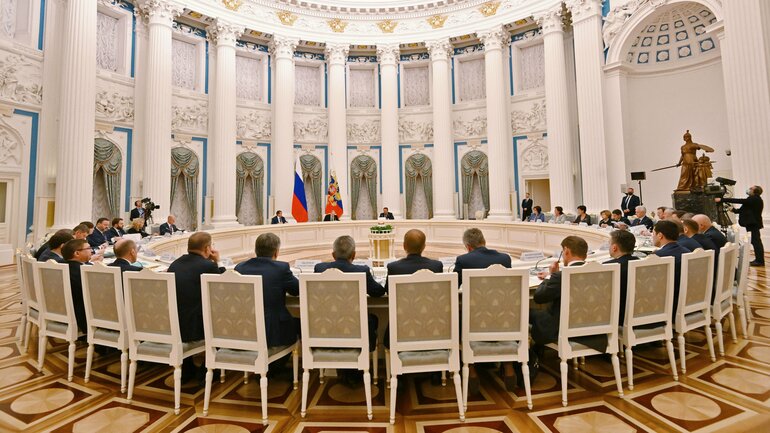Moscow is Trapped: Centre-regional Relations in Russia After the Invasion of Ukraine

Post-Soviet Russia is a constitutional federation, but in practice, centre-regional relations are not federal. The system of centre-regional relations is highly centralised politically. However, the conditions created by unprecedented economic sanctions against Russia, imposed after the invasion of Ukraine, require decentralised approaches. And this is not a question of imitating decentralisation, but of creating incentives for regional governors to form their own strategies for survival in the face of sanctions and the need for interregional coordination. Here, Moscow finds itself in a trap: the political risks of decentralisation are too high, while its absence is fraught with grave socio-economic consequences.
The system is extremely centralised politically
Central and regional executives benefit from, and thus support, the current institutional status quo. The current structures of federalism and decentralisation have become important elements of the institutional system, supporting the authoritarian regime and its political and economic stability. The Russian authoritarian regime has managed to exploit federalism and some forms of decentralisation as useful instruments to preserve the centre's dominance, avoid political instability and shift blame to the regional authorities in times of crises and policy failures.
At the same time, Russian regional leaders demonstrate their complete loyalty to the Kremlin. The incumbent governors are not only fulfilling Moscow's orders and requirements, but also are personally invested in maintaining the stability of the non-democratic system. Importantly, they are no longer interested in expanding the autonomy of their regions or restoring competitive regional elections. The regional ruling groups lack their own legitimacy and political independence. Moscow completely determines the fate of regional politicians – their term in office, moves to another position, resignation or even arrest and conviction for crimes (corruption, financial fraud or hiring a hitman). At any moment, President Putin could force any incumbent governor to resign and thus replace any incumbent with a “President-appointed acting governor”. In turn, the newly appointed acting governor always wins the election after being in office for a few months.
As expected, Russia’s invasion of Ukraine required the governors to demonstrate even greater, total loyalty to Kremlin. And the governors did so, claiming that “hardships only unite the Russian people”. However, excessive loyalty is no longer a universal means to ensure the governors’ political survival.
Economic sanctions will hit the regions hard
Sanctions on Russia will put further pressure on the Russian regions, although the losses from these unprecedented sanctions imposed by Western countries will be very unevenly distributed across Russian territory. All regions will face serious economic losses, but the greatest losses will be incurred by the most developed and globalised regions. For instance, Moscow’s Mayor Sobyanin said that the city was looking at 200,000 job losses from foreign companies shutting down operations.
Moscow is attempting to make things easier for the regions. On 1 May 2022, President Putin signed a Federal Law that “introduces special rules for executing budgets in Russia’s budgetary system in 2022, aimed at maintaining the financial stability of the Russian regions’ budgets amid external sanctions pressure”. The law also authorises the Ministry of Finance to allocate loans totalling 390.7 billion rubles from the federal budget in 2022, “so that Russian regions can repay their debts [to] credit institutions, foreign banks and international financial institutions. The federal law also exempts Russian regions from repaying in 2022 debts on budget loans provided to them earlier.” However, at the same time, the responsibilities of the governors are increasing (this strategy was already used at the start of the Covid-19 pandemic). On 16 March 2022, Vladimir Putin announced that heads of Russian regions would be granted additional powers. He stressed that the governors "will be able to make flexible and prompt decisions to support our citizens, the economy and the social sphere, based on the real situation on the ground”. It is important to note that this is not about true decentralisation, but simply about shifting responsibility and blame.
But what worked – more or less – during Covid-19, when the task was to survive the pandemic, is unlikely to work when the regions need to restructure their economies and find new drivers for development and when the governors are required to take the initiative and demonstrate an ability to coordinate. Politically, however, centre-regional relations in Russia are set up in such a way that they hinder rather than encourage initiative and coordination.
The main problem affecting centre-regional relations in Russia is that Moscow has to preserve its dominant position in the country's territorial structure, which means that it can only allow limited forms of economic, political and social development in the regions. The regions must remain in obedient dependence on Moscow. Most importantly, Moscow cannot allow any development of horizontal cooperation and coordination among the regions as it would undercut their dependence on Moscow. In fact, the centre cannot afford any development or reforms that would make regions economically independent. Faced with unprecedented sanctions, the Kremlin is caught in a trap: the economic situation requires decentralisation, but this political system does not allow it.
Irina Busygina is a Professor in the Department of Political Science and International Affairs at the Higher School of Economics in Saint Petersburg. She is also a member of ZOiS’s Academic Advisory Board.